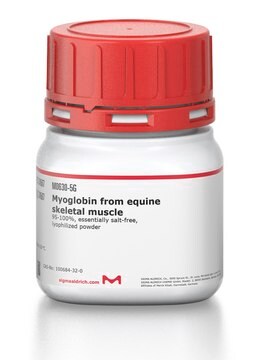MABC006F
Mouse IgG2b Negative Control, clone GC198, FITC conjugate
Mouse IgG2b Negative Control Monoclonal Antibody validated for use in Flow Cytometry & Immunofluorescence.
Zaloguj sięWyświetlanie cen organizacyjnych i kontraktowych
About This Item
Kod UNSPSC:
12352203
eCl@ss:
32160702
NACRES:
NA.42
Polecane produkty
pochodzenie biologiczne
mouse
Poziom jakości
białko sprzężone
FITC conjugate
forma przeciwciała
purified immunoglobulin
klon
GC198, monoclonal
producent / nazwa handlowa
Chemicon®
metody
flow cytometry: suitable
immunofluorescence: suitable
izotyp
IgG2b
Warunki transportu
wet ice
docelowa modyfikacja potranslacyjna
unmodified
Specyficzność
This antibody reacts with the outer membrane protein of some strains of Neisseria gonorrhoeae. No reaction with human cell surface or plasma components has been observed. However, some binding to Fc receptors may occur.
Immunogen
Protein I preparation from Neisseria gonorrhoeae.
Zastosowanie
FITC conjugated mouse IgG2b is a monoclonal antibody intended for use as a negative control in flow cytometry. Its use enables an estimation of non-specific binding of mouse monoclonal antibodies to cell surface components in peripheral blood and tissue.
SUGGESTED USAGE
Flow cytometry - use 10 μl direct from the vial per 100 μl of whole blood, or 1 x 10E6 peripheral blood mononuclear cells (PBMC) in 100 μl buffer.
SUGGESTED USAGE
Flow cytometry - use 10 μl direct from the vial per 100 μl of whole blood, or 1 x 10E6 peripheral blood mononuclear cells (PBMC) in 100 μl buffer.
Mouse IgG2b Negative Control Monoclonal Antibody validated for use in Flow Cytometry & Immunofluorescence.
Research Category
Secondary & Control Antibodies
Epitope Tags & General Use
Secondary & Control Antibodies
Epitope Tags & General Use
Research Sub Category
Isotype Control Antibodies
Isotype Control Antibodies
Postać fizyczna
Purified immunoglobulin. Fluorescein conjugated, ready to use. The antibody is supplied in 1.0ml phosphate buffered saline, pH 7.4, containing 0.2% bovine serum albumin and 0.1% sodium azide. The characteristics of each lot are tested by electrophoresis and flow cytometry.
Przechowywanie i stabilność
Store at 2 to 8oC, for up to 6 months. DO NOT FREEZE. Protect from light.
WARNING
The monoclonal reagent solution contains 0.1% sodium azide as a preservative. Due to potential hazards arising from the build up of this material in pipes, spent reagent should be disposed of with liberal volumes of water.
WARNING
The monoclonal reagent solution contains 0.1% sodium azide as a preservative. Due to potential hazards arising from the build up of this material in pipes, spent reagent should be disposed of with liberal volumes of water.
Informacje prawne
CHEMICON is a registered trademark of Merck KGaA, Darmstadt, Germany
Oświadczenie o zrzeczeniu się odpowiedzialności
Unless otherwise stated in our catalog or other company documentation accompanying the product(s), our products are intended for research use only and are not to be used for any other purpose, which includes but is not limited to, unauthorized commercial uses, in vitro diagnostic uses, ex vivo or in vivo therapeutic uses or any type of consumption or application to humans or animals.
Ta strona może zawierać tekst przetłumaczony maszynowo.
Kod klasy składowania
12 - Non Combustible Liquids
Klasa zagrożenia wodnego (WGK)
WGK 2
Temperatura zapłonu (°F)
Not applicable
Temperatura zapłonu (°C)
Not applicable
Certyfikaty analizy (CoA)
Poszukaj Certyfikaty analizy (CoA), wpisując numer partii/serii produktów. Numery serii i partii można znaleźć na etykiecie produktu po słowach „seria” lub „partia”.
Masz już ten produkt?
Dokumenty związane z niedawno zakupionymi produktami zostały zamieszczone w Bibliotece dokumentów.
Narges Labibzadeh et al.
Cell journal, 18(3), 302-309 (2016-09-08)
Nonunion is defined as a minimum of 9 months since injury without any visible progressive signs of healing for 3 months. Recent literature has shown that the application of mesenchymal stromal cells is safe, in vitro and in vivo, for
Passaging and colony expansion of human pluripotent stem cells by enzyme-free dissociation in chemically defined culture conditions.
Beers, J; Gulbranson, DR; George, N; Siniscalchi, LI; Jones, J; Thomson, JA; Chen, G
Nature Protocols null
Vivek Shukla et al.
Cancer research, 77(22), 6267-6281 (2017-09-25)
In this study, we generated induced pluripotent stem cells (iPSC) from normal human small airway epithelial cells (SAEC) to investigate epigenetic mechanisms of stemness and pluripotency in lung cancers. We documented key hallmarks of reprogramming in lung iPSCs (Lu-iPSC) that
Nasz zespół naukowców ma doświadczenie we wszystkich obszarach badań, w tym w naukach przyrodniczych, materiałoznawstwie, syntezie chemicznej, chromatografii, analityce i wielu innych dziedzinach.
Skontaktuj się z zespołem ds. pomocy technicznej